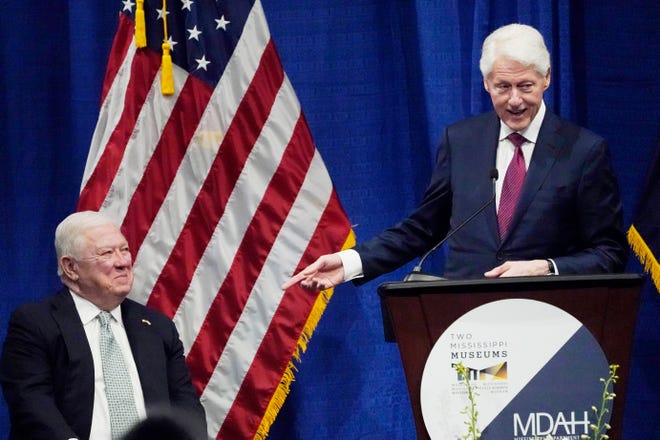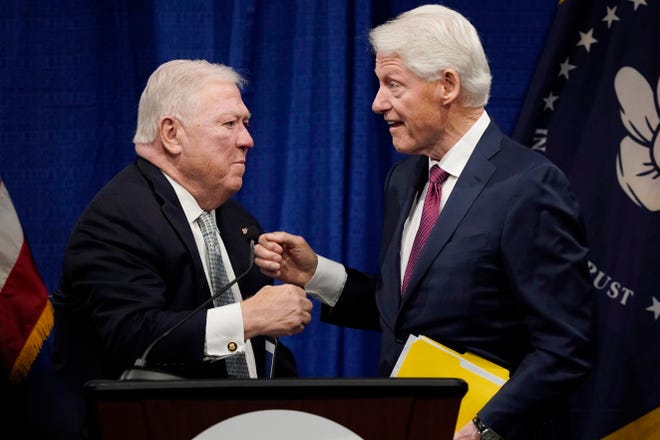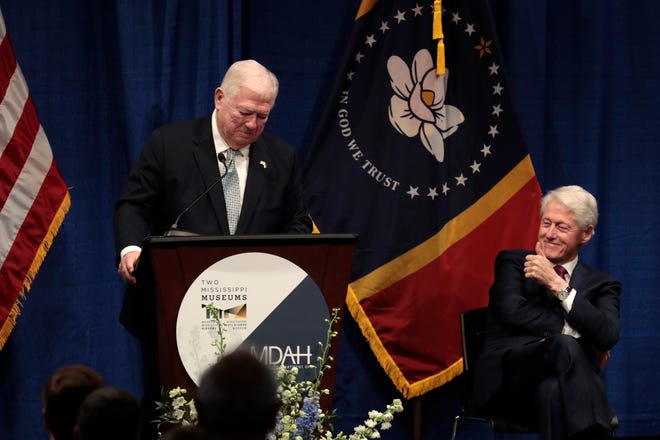Virtually every important Southern political figure from the past 40 years made their way into the Two Mississippi Museums in Downtown Jackson on Tuesday to celebrate the lives of former Gov. William Winter and First Lady Elise Winter.
Former U.S. Sen. Trent Lott, former Mississippi Attorney General Mike Moore, former Governors Phil Bryant and Ronnie Musgrove and national Democratic political consultant James Carville were all on hand to pay tribute to the late couple.
Headlining the event, former President Bill Clinton and former Mississippi Gov. Haley Barbour, shared the stage to honor both the Winters as critical figures who helped push Mississippi forward by emphasizing education and building a bridge between races in the late ’70s and early ’80s.

Winter, a Democrat, was governor from 1980 to 1984 and was known as a champion of public education. He was 97 when he died in December 2020.
‘Much work yet to be done’:Mississippi demonstrators plan to fight for abortion access
In other news:Medical marijuana opt-out deadline arrives. These are the cities that said no for now
Elise Winter was 95 when she died in July 2021. She was a founder of the Jackson area chapter of Habitat for Humanity.
“The ultimate lesson of their lives is that how your lives turn out is largely a function of how you decide to keep score,” Clinton said. “If you are keeping score on yourself, you know what the deal is. They kept score truthfully.
“All I know is that from the minute I met Bill Winter, I never had a scintilla of a doubt that whatever happened in our friendship, whatever happened in our lives, I was with one of the most authentic people I had ever known.”
Winter helped persuade state leaders of the need to build the Two Mississippi Museums — the Museum of Mississippi History and the Mississippi Civil Rights Museum, which are separate entities under the same roof in downtown Jackson. They opened in 2017.
Barbour lauded Winter for his willingness to reach across the aisles to make things happen and create consensuses even after he was no longer in the governor’s mansion. Barbour mentioned Winter’s work after Hurricane Katrina to bring Mississippians together and help get relief to victims across the Gulf Coast and throughout the state.

However, it was Winter and former Mississippi Supreme Court Justice Reuben Anderson who pushed Barbour forward as to the location of the Two Mississippi Museums.
“They brought me the solution to the problem of where to place the Civil Rights Museum, and I had the sense enough to recognize that they were absolutely right,” Barbour said. “And today, we are sitting in the solution. Here we have the result.”
Barbour said the Two Mississippi Museums were built with primarily state money of nearly $90 million, “to show the entire history of Mississippi … warts and all.”
“What we have done here is great for our state, and William Winter believed in this just as much as I did,” Barbour said.
Gov. Tate Reeves: ‘violence in Jackson has gone on for far too long’
As governor, Winter was best known for pushing Mississippi lawmakers to enact the Education Reform Act of 1982, which set rules for compulsory school attendance, established free public kindergartens and set quality standards for schools and teachers in a state that had long struggled with the intertwined problems of poverty, racial strife and poor academic performance.
Elise Winter was instrumental in the development of a visitors’ center at the Mississippi State Penitentiary at Parchman so families could see their imprisoned loved ones.

William Winter served in the 1990s as co-chairman of a national commission on racial reconciliation created by Clinton, whose time as governor of Arkansas overlapped with Winter’s time as governor of Mississippi.
More:Medical marijuana in Mississippi is now legal, while other Southern states mull reform
In other news:Mississippi home sales keep rolling despite mortgage rate hikes
William Winter joined the Mississippi Archives and History Board of Trustees in 1957. As board president, he oversaw the opening of the Eudora Welty House & Garden, the restoration of the Old Capitol and the construction of archives and history building that the Legislature named for him.

William Winter encouraged the Mississippi Department of Archives and History to strengthen its focus on Black history, acquiring collections of papers, developing exhibits and offering grants for the preservation of significant sites. His friendship with Myrlie Evers led to her donating the Medgar and Myrlie Evers Collection to the department in 2002.
Ross Reily can be reached by email at [email protected]. You can follow him on Twitter @GreenOkra1.

